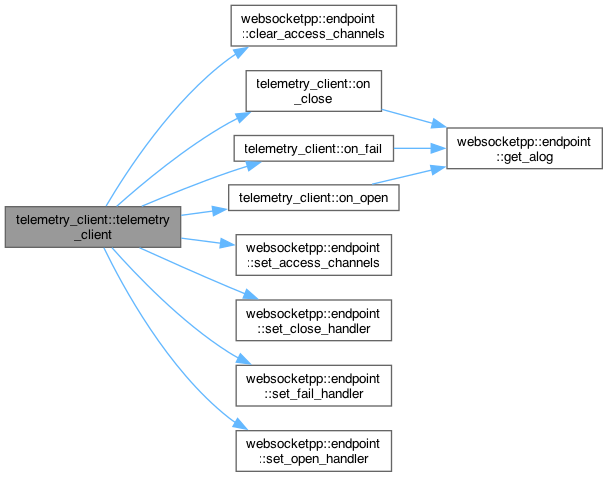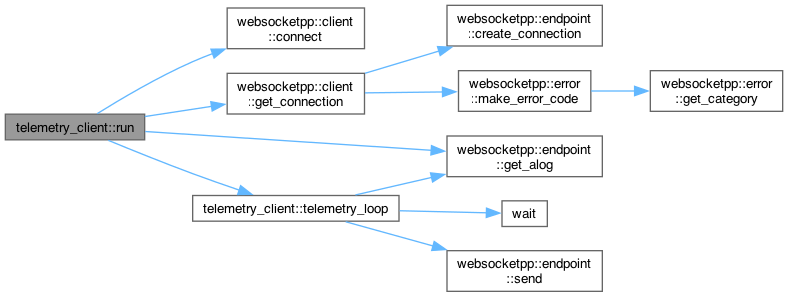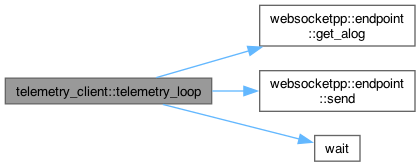Loading...
Searching...
No Matches
telemetry_client Class Reference
Public Types | |
| typedef websocketpp::client< websocketpp::config::asio_client > | client |
| typedef websocketpp::lib::lock_guard< websocketpp::lib::mutex > | scoped_lock |
Public Member Functions | |
| telemetry_client () | |
| void | run (const std::string &uri) |
| void | on_open (websocketpp::connection_hdl) |
| void | on_close (websocketpp::connection_hdl) |
| void | on_fail (websocketpp::connection_hdl) |
| void | telemetry_loop () |
Detailed Description
The telemetry client connects to a WebSocket server and sends a message every second containing an integer count. This example can be used as the basis for programs where a client connects and pushes data for logging, stress/load testing, etc.
Definition at line 15 of file telemetry_client.cpp.
Member Typedef Documentation
◆ client
Definition at line 17 of file telemetry_client.cpp.
◆ scoped_lock
| websocketpp::lib::lock_guard<websocketpp::lib::mutex> telemetry_client::scoped_lock |
Definition at line 18 of file telemetry_client.cpp.
Constructor & Destructor Documentation
◆ telemetry_client()
|
inline |
Definition at line 20 of file telemetry_client.cpp.
20 : m_open(false),m_done(false) {
21 // set up access channels to only log interesting things
26
27 // Initialize the Asio transport policy
28 m_client.init_asio();
29
30 // Bind the handlers we are using
31 using websocketpp::lib::placeholders::_1;
32 using websocketpp::lib::bind;
36 }
void on_open(websocketpp::connection_hdl)
Definition telemetry_client.cpp:68
void on_close(websocketpp::connection_hdl)
Definition telemetry_client.cpp:77
void on_fail(websocketpp::connection_hdl)
Definition telemetry_client.cpp:86
void set_fail_handler(fail_handler h)
Definition endpoint.hpp:287
void clear_access_channels(log::level channels)
Clear Access logging channels.
Definition endpoint.hpp:231
void set_open_handler(open_handler h)
Definition endpoint.hpp:277
void set_close_handler(close_handler h)
Definition endpoint.hpp:282
static level const app
Special channel for application specific logs. Not used by the library.
Definition levels.hpp:143
static level const disconnect
One line for each closed connection. Includes closing codes and reasons.
Definition levels.hpp:123
Here is the call graph for this function:

Member Function Documentation
◆ on_close()
|
inline |
Definition at line 77 of file telemetry_client.cpp.
77 {
79 "Connection closed, stopping telemetry!");
80
81 scoped_lock guard(m_lock);
82 m_done = true;
83 }
websocketpp::lib::lock_guard< websocketpp::lib::mutex > scoped_lock
Definition telemetry_client.cpp:18
Here is the call graph for this function:

Here is the caller graph for this function:

◆ on_fail()
|
inline |
Definition at line 86 of file telemetry_client.cpp.
86 {
88 "Connection failed, stopping telemetry!");
89
90 scoped_lock guard(m_lock);
91 m_done = true;
92 }
Here is the call graph for this function:

Here is the caller graph for this function:

◆ on_open()
|
inline |
Definition at line 68 of file telemetry_client.cpp.
68 {
70 "Connection opened, starting telemetry!");
71
72 scoped_lock guard(m_lock);
73 m_open = true;
74 }
Here is the call graph for this function:

Here is the caller graph for this function:

◆ run()
|
inline |
Definition at line 39 of file telemetry_client.cpp.
39 {
40 // Create a new connection to the given URI
41 websocketpp::lib::error_code ec;
43 if (ec) {
45 "Get Connection Error: "+ec.message());
46 return;
47 }
48
49 // Grab a handle for this connection so we can talk to it in a thread
50 // safe manor after the event loop starts.
51 m_hdl = con->get_handle();
52
53 // Queue the connection. No DNS queries or network connections will be
54 // made until the io_service event loop is run.
55 m_client.connect(con);
56
57 // Create a thread to run the ASIO io_service event loop
58 websocketpp::lib::thread asio_thread(&client::run, &m_client);
59
60 // Create a thread to run the telemetry loop
62
63 asio_thread.join();
64 telemetry_thread.join();
65 }
connection_ptr connect(connection_ptr con)
Begin the connection process for the given connection.
Definition client_endpoint.hpp:139
connection_ptr get_connection(uri_ptr location, lib::error_code &ec)
Get a new connection.
Definition client_endpoint.hpp:89
connection_type::ptr connection_ptr
Definition client_endpoint.hpp:60
Here is the call graph for this function:

Here is the caller graph for this function:

◆ telemetry_loop()
|
inline |
Definition at line 94 of file telemetry_client.cpp.
94 {
96 std::stringstream val;
97 websocketpp::lib::error_code ec;
98
99 while(1) {
101
102 {
103 scoped_lock guard(m_lock);
104 // If the connection has been closed, stop generating telemetry
105 if (m_done) {break;}
106
107 // If the connection hasn't been opened yet wait a bit and retry
108 if (!m_open) {
110 }
111 }
112
114 sleep(1);
115 continue;
116 }
117
118 val.str("");
120
123
124 // The most likely error that we will get is that the connection is
125 // not in the right state. Usually this means we tried to send a
126 // message to a connection that was closed or in the process of
127 // closing. While many errors here can be easily recovered from,
128 // in this simple example, we'll stop the telemetry loop.
129 if (ec) {
131 "Send Error: "+ec.message());
132 break;
133 }
134
135 sleep(1);
136 }
137 }
void send(connection_hdl hdl, std::string const &payload, frame::opcode::value op, lib::error_code &ec)
Create a message and add it to the outgoing send queue (exception free)
Definition endpoint_impl.hpp:162
Here is the call graph for this function:

Here is the caller graph for this function:

The documentation for this class was generated from the following file:
- libraries/fc/vendor/websocketpp/examples/telemetry_client/telemetry_client.cpp